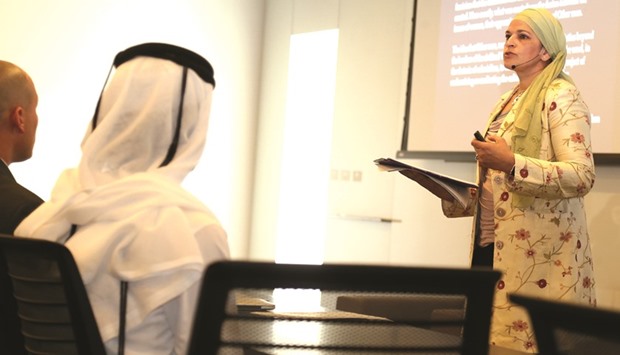The westernised definition of feminism, and misconceptions that surround Muslim feminists as being in opposition to Shariah, were challenged at a session at Northwestern University in Qatar (NU-Q).
In her session, “How Not to Talk about Muslim Feminism,” distinguished scholar and Islamic and US constitutional law expert, Asifa Quraishi-Landes, spoke about the goal of women’s empowerment within Muslim societies.
She was introduced by NU-Q professor Zachary Wright, as well as NU-Q student, Sheikh Thani bin Hamad al-Thani who introduced her on behalf of the student body.
She argued that years of western colonisation have skewed Islamic laws and societal behaviours in Muslim countries. “This negatively affected the global perception of Islam, and created false divides between those who support westernised liberation, and those grounded in Islamic law.”
“There seems to be a West versus Islam polarity,” explained Quraishi-Landes. “So, you are either for women’s rights and against Islam, or for Islam and against women’s rights. And there is very little room in between. That’s how the international discourse has been set up, and how most people, including Muslim women, talk about this.”
In introducing Quraishi-Landes, Wright noted that women in Muslim societies would benefit from more education in Islamic law. “Muslim societies think of Shariah as ultimate justice, not the reductionist image of hudud punishments so popular in the western media. Muslim women … have effectively asserted their rights through an appeal to Shariah-based norms specifying female rights,” Wright said.
Quraishi-Landes is a professor of law at the University of Wisconsin-Madison, where she teaches courses in Islamic law and US constitutional law. She is also recognised for her work in comparative legal theory, and women in Islamic law.
Quraishi-Landes argued that advocacy work for women’s rights in Muslim societies has been most successful when it avoids western liberation versus Islamic conservatism false binary. Her research in Islamic constitutional law, which remains an important source for ethical principles in modern governments across the Muslim world, shows that Muslim women had more rights and freedom prior to the colonisation era.

Asifa Quraishi-Landes speaking at NU-Q.
